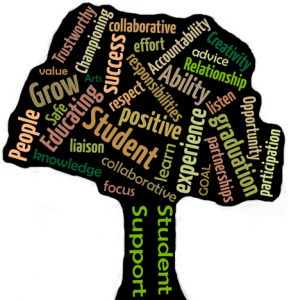By Jessica Wind (The Cascade) – Email
Print Edition: November 28, 2012
There is good news coming for new students within College of Arts programs – upper-level peer mentors.
Starting in January, the Arts Advice Centre will be hiring four strong upper-level students to be a part of their new peer mentoring program.
Each mentor will be matched up with as many as 10 mentees as they navigate university life, both academically and socially. They will be responsible for supporting, listening and responding to the individual needs of each of their students.
Elaine Newman, director for the Arts Advice Centre, explained this type of program provides new students with benefits in a specific area.
“While we can offer the professional academic advice to students . . . the peers can work with them on their own level,” she said, adding that new students are often nervous approaching the arts advisors at first.
Newman assured that the mentors will not take the place of other resources on campus.
“The mentors won’t have access to [the mentee’s] personal information . . . that’s where advisors are still doing the advising on the academic side,” she explained. If support is needed beyond the role of the mentor, the student will be directed to the arts advisors or counselling centre.
The peer mentors will take part in ongoing training through weekly group sessions, and will meet with the arts advisors and the other mentors to reflect and learn from each other.
Nicholas Johnson, an arts advisor in the centre, believes it will be just as rewarding for the mentors as it will be for the mentees.
“I think that, ultimately, the mentor will learn at least as much as the mentee in going through the process,” he said. “It will probably be a transformative experience for [both students].”
He went on to speak to the uniqueness of the program.
“To be a peer mentor, you have to be successful in university . . . and [the role of the mentor] is not likely to be exclusively academic,” he said. This would set it apart from Supported Learning Groups on campus, which is another student-to-student program on campus designed to help students study.
It wasn’t as easy as deciding to implement a program, Newman explained. It took collaboration with multiple departments in the university as well as a search for external funding.
“I worked with the associate dean, Susan Fisher . . . in conjunction with the development office as to what the peer mentor program would be, just the general framework of it,” she explained.
External funders were then approached and the Royal Bank of Canada offered $20,000 to fund the program over the next two years.
In that time Newman and Johnson hope to see the program grow beyond four mentors into something ongoing.
“In the development of the program, part of the goal will be to . . . expand so that all first-year students have an opportunity to be connected with . . . a mentor,” Johnson said.
The program is still in the planning stages, and the Arts Advice Centre is still working out all the details.
“We’re building it from scratch,” Johnson said. “We don’t have an existing model to work from, but we’re really excited about it.”
Newman said there are a couple of ways they’ll let first-year students know about the program.
“We will be contacting them probably initially by email, but we will also be doing an advertising campaign indicating that we have this peer mentor program,” she said.
No mentors have been hired yet, but fourth-year history and anthropology student Tom Funk learned about the opportunity from a post by history department head, Alisa Webb, on the UFV History Students Past and Present Facebook page. He has applied and hopes he will be one of the four mentors selected.
“In the future I plan on being a professor,” he said, “So this experience of helping . . . others in a subject I am incredibly passionate about is a bit of a dream.”
“I believe a program like this is a fantastic way to connect the older students with the young,” he continued. “I hope others take notice.”
Now well into his degree, Funk wishes a peer mentoring program had been available to him in his first years at UFV.
“First year is always a difficult transition so I would have loved the opportunity to get a road map by a fourth-year student,” he explained. “It also helps to solidify an identity to the university.”


